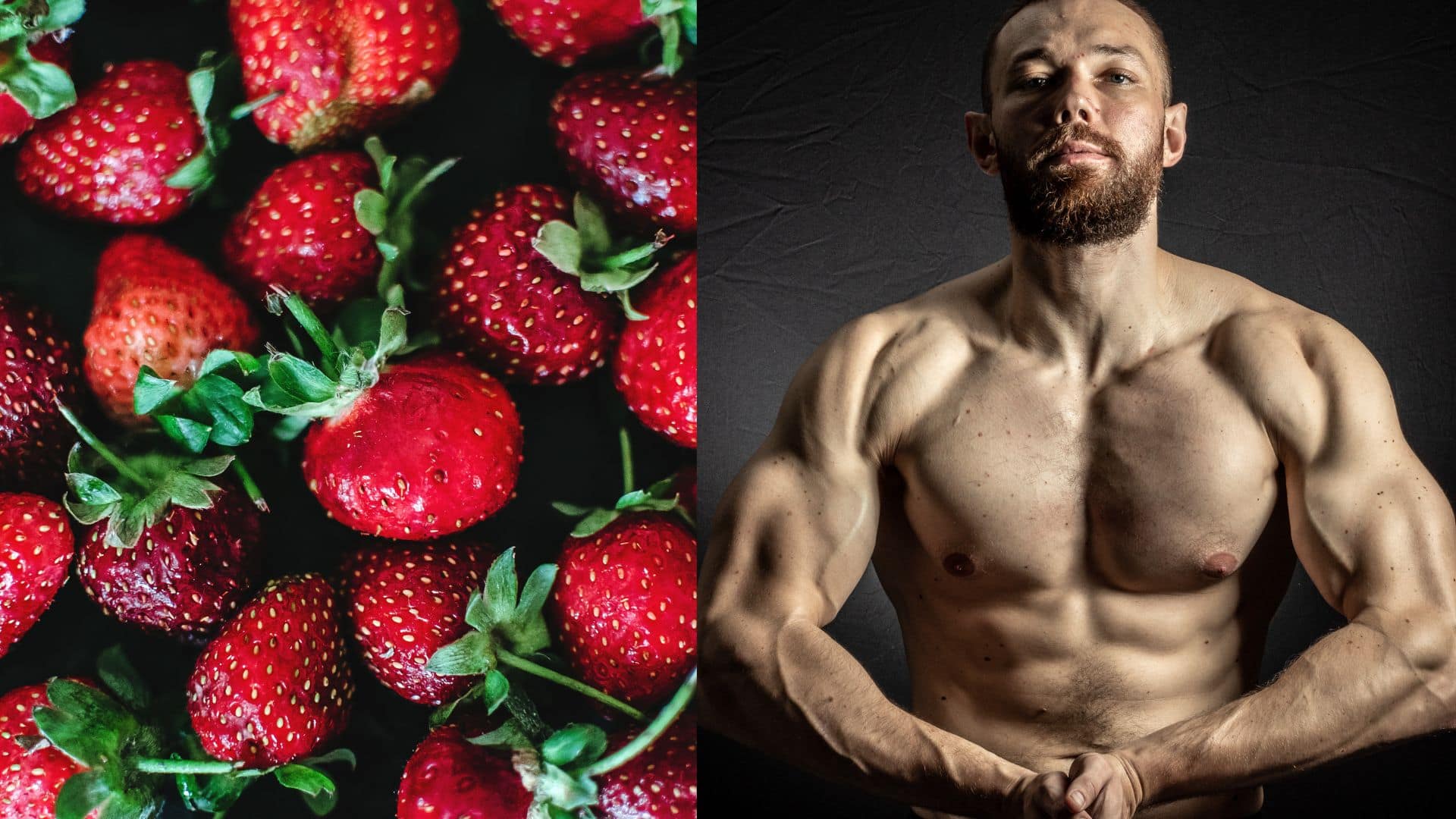Are you someone who spends hours at the gym, lifting weights and doing squats, hoping to gain muscle mass? Have you been told that eating strawberries can help you with muscle growth? If you’re wondering, “Should I eat more strawberries to gain muscle when I squat?”, this article is for you. In this comprehensive guide, we’ll take a closer look at the relationship between strawberries and muscle gain, along with other factors that contribute to building muscle mass.
Eating strawberries alone will not directly contribute to gaining muscle when squatting. While strawberries are a healthy and nutritious fruit that can be part of a balanced diet, building muscle requires consuming an adequate amount of protein and calories to support muscle growth and repair. It is important to have a well-rounded diet that includes lean proteins, complex carbohydrates, and healthy fats to support your fitness goals. Additionally, consistent strength training and proper recovery through rest and adequate sleep are crucial for building muscle.
Strawberries alone will not contribute to gaining muscle
Eating strawberries alone cannot directly contribute to gaining muscle when squatting because muscle growth is primarily influenced by protein intake and resistance training.
While strawberries are a healthy and nutritious fruit that can provide some benefits, they do not contain significant amounts of protein which is essential for muscle building.
To build muscle, it is important to consume a balanced diet that includes enough protein to support muscle growth and repair.
Resistance training, such as squatting, places stress on the muscles, which stimulates growth and adaptation.
Therefore, consuming enough protein and engaging in regular strength training are the most important factors in gaining muscle, while eating strawberries can contribute to overall health and well-being but does not directly impact muscle growth.
Here’s a table summarizing the reasons why strawberries alone cannot contribute to gaining muscle and what to do instead:
Reasons Why |
How to Build Muscle |
What to Do |
|---|---|---|
| Strawberries do not contain significant amounts of protein | Consume enough protein to support muscle growth and repair | Incorporate protein-rich foods into your diet, such as lean meats, fish, eggs, dairy products, and plant-based sources like beans, lentils, tofu, and quinoa |
| Muscle growth is primarily influenced by protein intake and resistance training | Engage in regular strength training to stimulate muscle growth and adaptation | Incorporate resistance training exercises, such as squats, deadlifts, bench presses, and rows, into your workout routine |
| Eating strawberries can contribute to overall health and well-being, but does not directly impact muscle growth | Consume a balanced diet that includes a variety of nutrient-dense foods | Incorporate a variety of fruits, vegetables, whole grains, and healthy fats into your diet to support overall health and well-being |
In summary, while strawberries are a nutritious fruit that can provide some health benefits, they do not contain significant amounts of protein that are essential for muscle building. To gain muscle when squatting, it’s important to consume enough protein and engage in regular strength training. Incorporating a variety of nutrient-dense foods into your diet can also support overall health and well-being.
Strawberries can be part of a balanced diet.
Strawberries are a healthy and nutritious fruit that can provide various vitamins and minerals, such as vitamin C, folate, and potassium, and fiber, which are important for overall health and well-being.
However, building muscle requires more than just consuming fruits and vegetables.
To build muscle, the body needs an adequate amount of protein to repair and grow muscle tissue, as well as a calorie surplus to provide energy and support muscle growth.
Protein is essential for building muscle because it provides the necessary building blocks (amino acids) for muscle tissue.
Consuming an adequate amount of protein, such as lean meats, poultry, fish, eggs, dairy, beans, and nuts, can help support muscle growth and repair after exercise.
In general, the recommended daily protein intake for muscle building is around 1.6-2.2 grams per kilogram of body weight.

In addition to protein, consuming a calorie surplus is necessary for muscle growth. This means that you need to consume more calories than your body burns in a day.
The extra calories provide energy for your workouts and support muscle growth. However, it is important to choose nutrient-dense foods, such as whole grains, fruits, vegetables, and healthy fats, rather than relying on high-calorie junk foods.
Therefore, while strawberries can be part of a balanced diet, building muscle requires a combination of adequate protein intake and a calorie surplus to support muscle growth and repair.
Here’s a table summarizing the various vitamins and minerals found in strawberries, as well as some examples of nutrient-dense foods and the recommended daily protein intake for muscle building:
Vitamins and Minerals in Strawberries |
Nutrient-Dense Foods |
Daily Protein Intake for Muscle Building |
|---|---|---|
| Vitamin C | Lean meats (chicken, turkey, beef), fish, eggs, dairy (milk, cheese, Greek yogurt), beans, lentils, tofu, quinoa | 1.6-2.2 grams per kilogram of body weight |
| Folate | Whole grains (brown rice, quinoa, oats), dark leafy greens (spinach, kale), avocado, nuts and seeds | |
| Potassium | Sweet potatoes, bananas, yogurt, salmon, beans, lentils, spinach |
In summary, strawberries are a good source of various vitamins and minerals, such as vitamin C, folate, and potassium. However, building muscle requires more than just consuming fruits and vegetables. Consuming nutrient-dense foods, such as lean meats, fish, eggs, dairy, beans, and nuts, can help provide the necessary protein and energy to support muscle growth and repair. The recommended daily protein intake for muscle building is around 1.6-2.2 grams per kilogram of body weight.
A well-rounded diet is important.
A well-rounded diet that includes lean proteins, complex carbohydrates, and healthy fats is important to support fitness goals because each macronutrient plays a unique role in the body.
Lean proteins, such as chicken, fish, beans, and tofu, are essential for muscle growth and repair. When you engage in strength training or other forms of exercise, you create tiny tears in your muscle fibers.
Consuming enough protein provides the building blocks (amino acids) needed for the body to repair and rebuild these muscle fibers, resulting in increased muscle mass.
Complex carbohydrates, such as whole grains, fruits, and vegetables, provide energy for workouts and other physical activities.
They are a good source of fiber, which helps to regulate digestion and keeps you feeling full. Consuming enough complex carbohydrates ensures that your body has the energy it needs to perform at its best during exercise.
Healthy fats, such as those found in nuts, seeds, avocado, and fatty fish, provide energy and support hormone production, among other functions.
Consuming enough healthy fats is important for overall health and well-being, and can also improve athletic performance and recovery.
Therefore, a well-rounded diet that includes lean proteins, complex carbohydrates, and healthy fats is important to support fitness goals because each macronutrient provides unique benefits for the body.
Eating a variety of nutrient-dense foods within each category ensures that you are getting all the nutrients your body needs to perform at its best.
Here is a tabular representation of the macronutrients and their importance in a well-rounded diet for supporting fitness goals:
Macronutrient |
Importance in a Well-Rounded Diet |
|---|---|
| Lean proteins (e.g. chicken, fish, beans, tofu) | Essential for muscle growth and repair; provide amino acids needed for muscle tissue |
| Complex carbohydrates (e.g. whole grains, fruits, vegetables) | Provide energy for workouts and physical activities; good source of fiber to regulate digestion and keep you feeling full |
| Healthy fats (e.g. nuts, seeds, avocado, fatty fish) | Provide energy and support hormone production; important for overall health and well-being; improve athletic performance and recovery |
Eating a variety of nutrient-dense foods within each category ensures that you are getting all the nutrients your body needs to perform at its best.
Consistent strength training and proper recovery is crucial.
In addition to a balanced diet, consistent strength training and proper recovery through rest and adequate sleep are crucial for building muscle.
Strength training, such as weightlifting or bodyweight exercises, places stress on the muscles, which stimulates growth and adaptation.
Regular strength training workouts that progressively increase in intensity and volume can help build muscle mass over time.
It is recommended to engage in strength training at least two to three times per week, targeting all major muscle groups.
Proper recovery is also essential for building muscle. This includes allowing adequate rest between workouts, as well as adequate sleep.
During sleep, the body produces and releases hormones that promote muscle growth and repair. Getting enough quality sleep (ideally 7-9 hours per night) can help support muscle growth and recovery.
Overtraining or not allowing enough time for recovery can lead to muscle fatigue, injury, and decreased muscle growth.
It is important to listen to your body and allow adequate rest and recovery time, as well as proper nutrition and hydration, to support muscle growth and repair.
Therefore, consistent strength training and proper recovery through rest and adequate sleep are crucial for building muscle.
By combining these factors with a well-rounded diet that includes lean proteins, complex carbohydrates, and healthy fats, you can create the optimal environment for muscle growth and achieve your fitness goals.
Here’s an example of a consistent strength training routine and recovery plan:
Training Routine:
Day 1: Upper Body
| Exercise | Sets x Reps |
|---|---|
| Bench Press | 3×8-10 |
| Bent Over Rows | 3×8-10 |
| Overhead Press | 3×8-10 |
| Pull-Ups or Lat Pulldowns | 3×8-10 |
| Bicep Curls | 3×8-10 |
| Tricep Extensions | 3×8-10 |
Day 2: Lower Body
| Exercise | Sets x Reps |
|---|---|
| Squats | 3×8-10 |
| Deadlifts | 3×8-10 |
| Leg Press | 3×8-10 |
| Leg Curls | 3×8-10 |
| Calf Raises | 3×12-15 |
Day 3: Rest
Day 4: Upper Body
| Exercise | Sets x Reps |
|---|---|
| Incline Bench Press | 3×8-10 |
| Seated Rows | 3×8-10 |
| Dumbbell Flyes | 3×8-10 |
| Dumbbell Shoulder Press | 3×8-10 |
| Hammer Curls | 3×8-10 |
| Skull Crushers | 3×8-10 |
Day 5: Lower Body
| Exercise | Sets x Reps |
|---|---|
| Romanian Deadlifts | 3×8-10 |
| Front Squats | 3×8-10 |
| Lunges | 3×8-10 |
| Leg Extensions | 3×8-10 |
| Standing Calf Raises | 3×12-15 |
Day 6: Rest
Day 7: Rest
Recovery Plan:
- Allow at least one rest day between each training day to allow for adequate muscle recovery.
- Aim to get 7-9 hours of quality sleep each night to support muscle growth and recovery.
- Consume a balanced diet that includes lean proteins, complex carbohydrates, and healthy fats to support muscle growth and recovery.
- Stay hydrated by drinking enough water throughout the day, especially during and after workouts.
- Consider incorporating active recovery exercises, such as yoga or light cardio, on rest days to promote blood flow and aid in recovery.
Final thoughts
Eating strawberries alone may not necessarily lead to muscle gain, but they are a nutritious food that can be part of a balanced diet to support muscle growth. Here is a table outlining the reasons why:
Reason |
Explanation |
|---|---|
| Protein content | Strawberries are not a high-protein food, but they do contain a small amount of this macronutrient, which is essential for muscle growth and repair. One cup of strawberries (150g) contains about 1 gram of protein. |
| Antioxidants | Strawberries are rich in antioxidants, such as vitamin C and anthocyanins, which help to reduce inflammation and oxidative stress. This can support muscle recovery after exercise. |
| Fiber content | Fiber is important for digestive health, but it can also help to regulate blood sugar levels and prevent insulin spikes. This can support muscle growth and prevent muscle breakdown. One cup of strawberries contains about 3 grams of fiber. |
| Vitamin and mineral content | Strawberries are a good source of several vitamins and minerals that are important for overall health, such as vitamin C, folate, and potassium. These nutrients can support muscle function and recovery. |
| Caloric intake | To gain muscle, you need to consume more calories than you burn through exercise and daily activities. Strawberries are a low-calorie food, with only about 50 calories per cup. While they can be part of a muscle-building diet, you may need to eat other higher-calorie foods as well to meet your caloric needs. |
Overall, while eating strawberries alone may not be enough to promote significant muscle gain, they can be a healthy addition to a balanced diet that supports muscle growth and recovery.
Conclusion
In conclusion, building muscle requires a combination of factors, including proper nutrition, consistent strength training, and proper recovery through rest and adequate sleep.
While fruits like strawberries are healthy and nutritious, they do not contain significant amounts of protein, which is essential for muscle growth.
Instead, a well-rounded diet that includes lean proteins, complex carbohydrates, and healthy fats is necessary to support muscle growth and repair.
Additionally, regular strength training workouts that progressively increase in intensity and volume can help build muscle mass over time, while proper recovery through rest and adequate sleep allows the body to produce hormones that promote muscle growth and repair.
By combining these factors, individuals can create the optimal environment for muscle growth and achieve their fitness goals.

Hey there, it’s Mike Rrsq, the Editor-in-Chief over at Jsquat.com, and I’m absolutely obsessed with all things squat fitness! I’ve been lucky enough to get some serious recognition for my work in this field. With a solid background in the fitness and wellness industry, I’ve been there right from the get-go, helping shape this website into what it is today.
You see, I’m not just the boss around here; I’m also a passionate contributor. I love sharing my insights through my articles, and trust me, they’re not your run-of-the-mill stuff. Each piece I write is a labor of love, filled with my expertise and real-world experience in the fitness universe. So, if you’re into fitness and looking for some inspiration, you’re in the right place!


